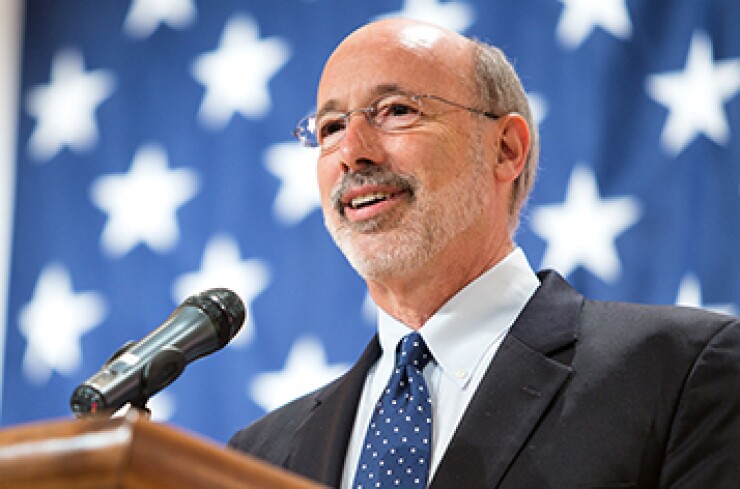
Gov. Tom Wolf on Tuesday painted a dark picture of Pennsylvania's finances, urging lawmakers to plug a nearly $2 billion budget deficit that has bond rating agencies poised for more downgrades.
"This deficit isn't just a cloud hanging over Pennsylvania's long-term future. It is a time bomb, ticking away, right now as I speak," Wolf told the legislature at the state capitol in Harrisburg, in a speech that frequently referenced Pennsylvania's wobbly standing in the capital markets.
"When Harrisburg doesn't take our budget problem seriously, the folks who rate our credit stop taking Harrisburg seriously," said Wolf.
Pennsylvania, one of the lowest-rated states, has received five downgrades in the past five years. Moody's Investors Service rates the commonwealth's general obligation bonds Aa3. Fitch Ratings and Standard & Poor's rate them AA-minus.
Without particulars, Wolf urged passage of a tax-and-revenue package, debate over which has gridlocked Harrisburg and left the commonwealth without a full budget for fiscal 2016, which began last July 1.
Wolf, meanwhile, sidestepped the nuts and bolts on the $32 billion fiscal 2017 budget that he officially presented.
The governor on Dec. 29 signed three-fourths of a $30 billion fiscal 2016 plan, freeing up funds for school districts and social service agencies while holding out for increased basic education aid through line-item vetoes. One week before that, a faction of House of Representatives blocked a compromise budget that appeared on the verge of passage.
Wolf's gloom-and-doom tone on Tuesday resembled that of Connecticut Gov. Dannel Malloy, a fellow Democrat who last week urged state agencies to cut their budgets 6% across the board.
"Thousands of teachers will be laid off," said Wolf, adding that school districts could face even more drastic cuts for technical education, special education, pre-kindergarten and Head Start programs. He also said municipalities could face staggering tax increases.
Last month, state Treasurer Timothy Reese extended a $2 billion line of credit to the commonwealth to prevent its general fund cash balance from falling to as much as $922 million in the negative.
Wolf on Tuesday did not reference Pennsylvania's unfunded pension liability, estimated at nearly $60 billion for its two major pension funds, the Public School Employees' Retirement System and the State Employees' Retirement System. Pennsylvania has not made a full actuarially required contribution since 2004.
Last Friday, Moody's said the commonwealth's options for curbing pension costs are limited.
While lawmakers have discussed moving new state hires from a traditional, defined-benefit plan to a 401(k)-style defined-contribution plan, one leading Pennsylvania actuary said plan-design changes alone are woefully insufficient.
"Pennsylvania policymakers under the heading of 'pension reform' continue to ignore the fundamental problem with our state pension system – the absence of proper funding policies," said Richard Dreyfuss of Hummelstown, Pa., an adjunct fellow with the Manhattan Institute for Policy Research.
"To talk about 'pension reform' while ignoring funding reforms will only increase the risk of future plan insolvency and will likely lead to future credit downgrades since the basic problem remains unaddressed," said Dreyfuss.





